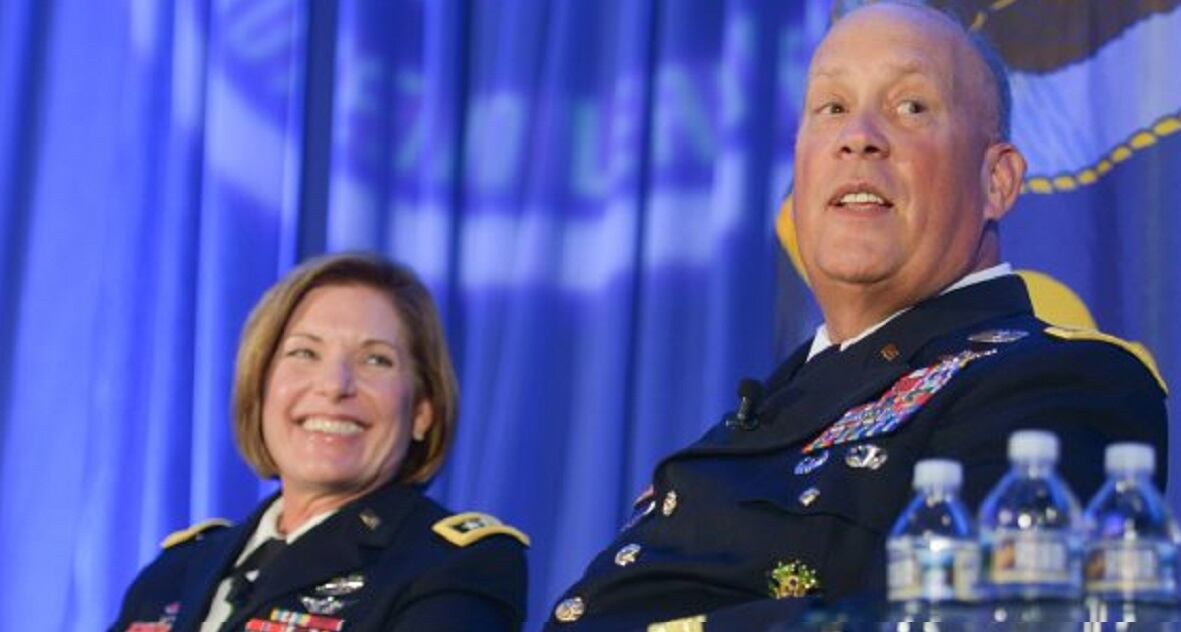For the first time in the Army’s history, two sisters have attained the rank of general, the service said.
It isn’t surprising that Maj. Gen. Maria Barrett, 53, and Brig. Gen. Paula Lodi, 51, have climbed some of the highest ranks in the Army, the women’s brother Rus Lodi told USA Today. The sisters, who he dubbed “leadership junkies,” always amazed the family and have been a “great source of pride” for the family, he said.
The Army isn’t surprised by the sisters’ success either.
“Maj. Gen. Maria Barrett and Brig. Gen. Paula Lodi represent the best America has to offer,” Acting Army Secretary Ryan McCarthy said, according to USA Today. “However, this comes as no surprise to those who have known them and loved them throughout this extraordinary journey. This is a proud moment for their families and for the Army.”
Although there have been cases where fathers and sons, and even a married couple have become generals, the Army doesn’t believe that there is another group of sisters who have pinned on general’s stars.
“The fact that we’re sisters, not brothers, I think it’s a huge illustration of how far we’ve come as a service,” said Lodi, who is now deputy chief of staff for operations in the Army's Surgeon General's office.
RELATED

Barrett was initially interested in joining the Army to help pay for school at Tufts University, and wanted to go on to a career at the State Department. After going through Reserve Officer Training Corps as an undergraduate student, she was commissioned as a second lieutenant in 1988.
But as Barrett advanced as an officer, she realized the Army was a better fit for her.
“When I talk to younger officers, I tell them the reason I joined is not the reason why I stayed,” said Barrett, who is the commanding general of the Army’s Network Enterprise Technology Command, or NETCOM. “Our democratic experiment, even on its most imperfect day, is worth defending.”
Lodi, who The Washington Post reports was promoted to brigadier general in July, also didn’t expect to stay in the Army for as long as she has.
After she watched a documentary on the first women at the U.S. Military Academy at West Point in elementary school, she told her father she had decided she wanted to attend.
Instead of West Point, Lodi opted to attend Rutgers University and graduated from its ROTC program before she was commissioned in the Medical Service Corps.
Ultimately, Lodi wanted to become a dietitian when she got out of the service and became a civilian. But several years in as an officer, Lodi decided that she wanted to continue serving in the Army.
“I don’t know at what point probably four, maybe five years in, it just occurred to me, I absolutely loved what I was doing in the Medical Service Corps,” Lodi said.
Even with the confidence from their family and other Army service members, Barrett said she doubts she and her sister would have imagined what was in store for them as Army officers.
"I don't think either one of us told us back in high school when we were both playing soccer together, that this is where we would be 27, 30 years from now," Barrett said. "I don't think either one of us would have told you that this is how the story would end."
As of February 2018, there were 63 female admirals and generals in all five branches of the military including the Coast Guard, according to a Service Women’s Action Network report issued in April 2019. That’s more than double the number there were in the start of fiscal year 2000, according to the report.
Melissa Dalton, a former Defense Department official and now senior fellow at the Center for Strategic and International Studies, said the sisters’ success was analogous to that of retired Army Gen. Ann Dunwoody, who was the first woman in any branch of the military to attain four stars.
“For both men and women increasingly normalizing women in leadership positions matters,” Dalton said, according to USA Today. “The fact that it comes from the same family is an incredible accomplishment.”









